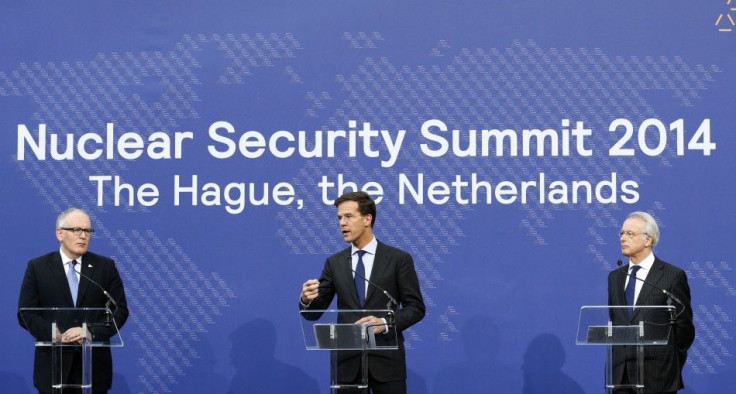58 World Leaders Meet for Nuclear Summit in Hague, Likely to Discuss Crisis in Ukraine

Some 58 world leaders are meeting on Monday and Tuesday to discuss global security at a time a crisis in Ukraine has developed.
This year's Nuclear Security Summit (NSS) has three themes including
- working to prevent nuclear terrorism by reducing the amount of dangerous nuclear material in the world
- improving the security of all nuclear material and radioactive sources
- improving international cooperation
The Irish Times reported an early draft of the official communique to be agreed by the participating countries which commits them to "continue to minimise the use of HEU [highly enriched uranium] through the conversion of reactor fuel from HEU to low-enriched uranium, where technically and economically feasible."
According to the Internationals Atomic Energy Agency (IAEA) records there have been 16 instances of theft since 1993 involving either highly enriched uranium or plutonium that can be used in a potential nuclear bomb.
"The potential would be a very very lethal attack and so you have to prepare for that and you have to make sure that all the safeguards that are in place though agencies like the IAEA is really doing that work and making sure all safeguards are in place to prevent nuclear materials from being stolen," Thomas Renard, Senior Research Fellow at Egmont Royal Institute for International Relations, said.
In 2013, the IAEA said there were about 140 cases of missing or unauthorised use of nuclear and radioactive material reported.
But the ongoing crisis in Ukraine has been largely believed to dominate the 2014 NSS talks.
"It will be an opportunity for us to explain to each other what we are doing and where we are going, to coordinate our actions," Reuters quoted an unidentified senior EU official.
Russian President Vladimir Putin will not be attending the 2014 version of the NSS, but has instructed his foreign minister instead, Sergei Lavrov, to attend on his behalf. Mr Lavrov is expected to hold talks with U.S. Secretary of State John Kerry.
U.S. President Barack Obama as well as leaders of Germany, Britain, Canada, France, Japan and Italy are expected for the talks.
"I think these multilateral summits are an excellent opportunity for world leaders to discuss bilaterally and also amongst smaller groups of countries various issues which are high on their minds," Dutch Prime Minister Mark Rutte told The Associated Press.





















